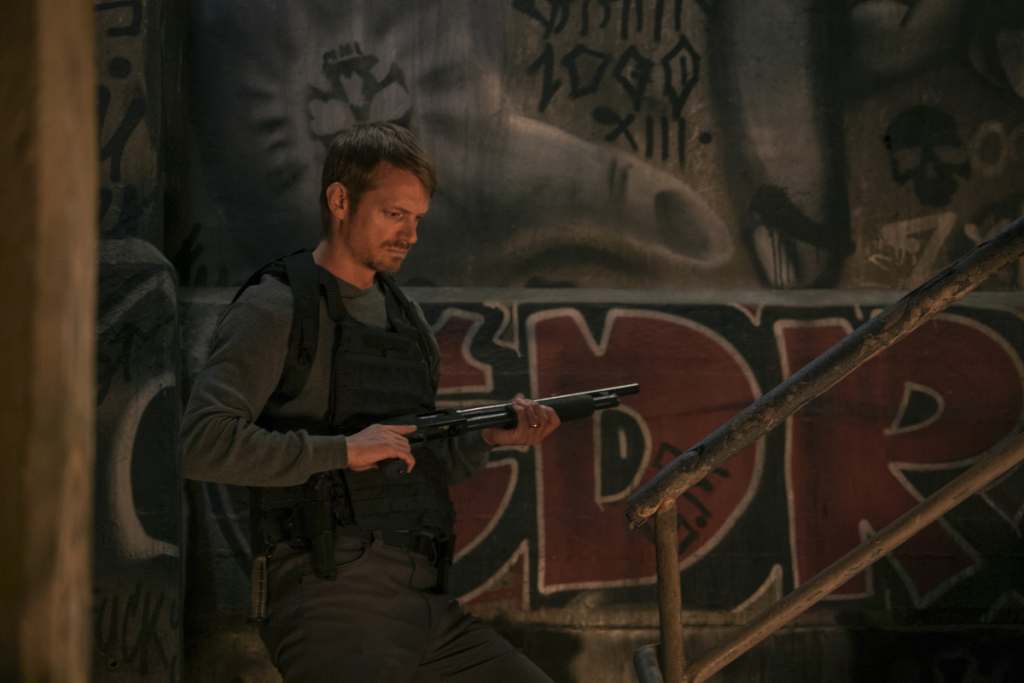Silent Night is now available from Lionsgate wherever movies are sold.
Moviegoers went nuts when celebrated filmmaker John Woo was getting back in the director’s chair. With a remake of The Killer still up in the air, the casting of actor Joel Kinnaman in the action thriller, Silent Night, was intended to hail a major welcome back for the Hard Boiled and A Better Tomorrow director by audiences long after leaving off his U.S. slate with Ben Affleck sci-fi, Paycheck.
I was also keen on how the responses were before deciding if I would go see it. Nevermind that I’d been stuck at home with a family member hospitalized so going anywhere for fun wasn’t much of an option, but I was swayed a bit by a few of my mutuals who showed up to the theater only to leave their seats feeling disappointed. The film is now available on disc and digital and having seen it prior to this review, I find myself coming to a conclusion similar to the stance I’ve taken on a lot of films where I felt the discontent wasn’t entirely warranted.
To start, I think Woo’s choice to direct a prominently dialogue-free modern action screenplay by Robert Archer Lynn is one of the boldest I’ve seen. That vision is emboldened by the placement of a lead character in Brian (Joel Kinnaman) whose gets shot in the throat after a harrowing chase on foot. The film gradually toggles back and forth to reveal the events that propel our story as its happening, during which Brian and wife, Saya (Catalina Sandino Moreno) are forced to cope with the tragic loss of their son after being caught in the crossfire of a gangland drive-by shooting.
The lasting effects of the incident prove even greater with Brian turning his feelings inward, with Saya forced to bear the weight of their shared pain while her husband turns from drinking his pain away in a dark room, to consuming himself with enough rage to get back in shape for a possible chance at retribution a year from their son’s death. Of course, he tries to consult with the lead detective (Scott Mescudi) on the case, when instead he turns to a room with a wall full of suspects’ mugshots, including the tattooed gangleader who put a bullet in his throat, Playa (Harold Torres.
At this point, Brian is at the darkest phase of his life, turning his pain into hatred with a bloodlust that needs quenching. The film is quick to convey exactly what this leads to, as well as how, showcasing a multi-dimensional look at the toll that tragedy has taken on both husband and wife, with no immediate positives in sight. It’s simple to say that there are no easy answers for responding to mitigating grief, but it also compels you to ask, especially while following Brian’s journey and you’re compelled to cheer him on.
It’s the kind of inquiry worth minding, particularly during a tumultuous era in America regarding guns, white privilege and xenophobic perceptions of our neighborhoods amid fearmongering about how streets are rampant with crime. Woo’s film certainly pokes the bear in that regard with enough visual imagery of a mourning husband and wife driving down the streets, eyeing walls tained with graffitti and drug dealers working in broad daylight. If this makes you wonder what the hell kind of film you’re watching, you’re probably not alone, and at the same time, you’re also forgiven for simply taking it all in as part of the film’s basic modus operandi as a revenge flick like almost any other you’ve watched in the last half century, if that.
Mind you, there are significant differences between Silent Night and other bloviating, politically-driven and half-cocked works by so-called artists who call themselves creating in response to some agenda. Those people are hardly in it for the arts and entertainment, and for that matter, don’t deserve to share the same space as a living legend of cinema who transformed the action genre, influencing generations of moviegoers and filmmakers alike.
None of this is to say that Silent Night is entirely perfect in its delivery. Indeed there are some creative aspects that I would have preferred be done differently. What matters, at least for me, is how poetic the film is, right down to the last kill – done accordingly in a way that I would have expected in a Woo-directed thriller about a vengeful man whose voice gets taken away with a bullet.
Indeed a film can’t always rest on visuals, performance and scoring alone to create a substantial feature-length film audiences can sit through. Still, it can be done, and two decades after his last Hollywood stint, Woo did it, and regardless of whatever creative flaws you might feel hinder its promise, or any red flags that could wreak of a more deplorable subtext, there’s no denying that Silent Night is the kind of film that gets you talking.
Thanks for reading, and if you enjoyed this content, buy me a coffee!
Lead photo: Carlos Lapati for Lionsgate

